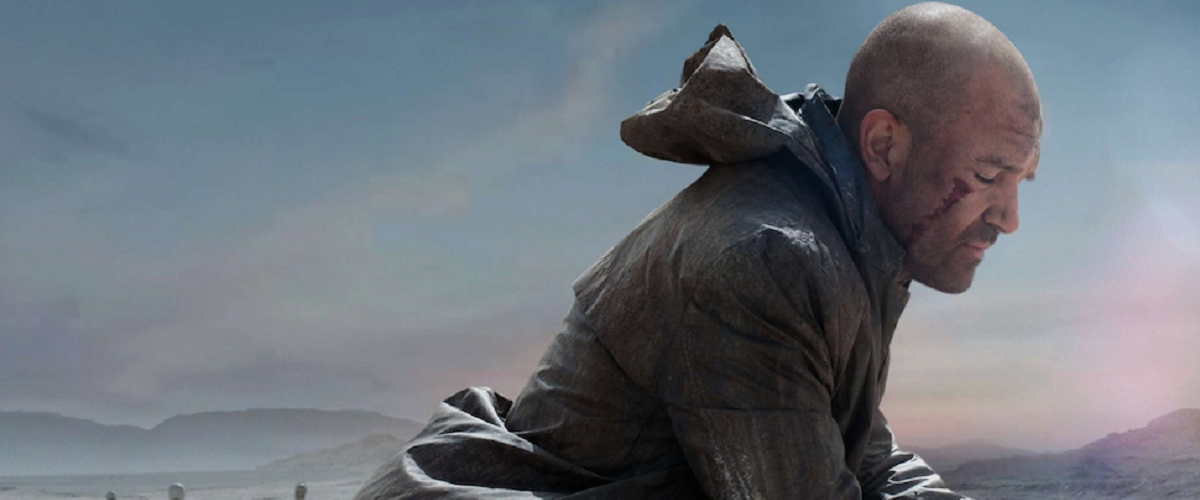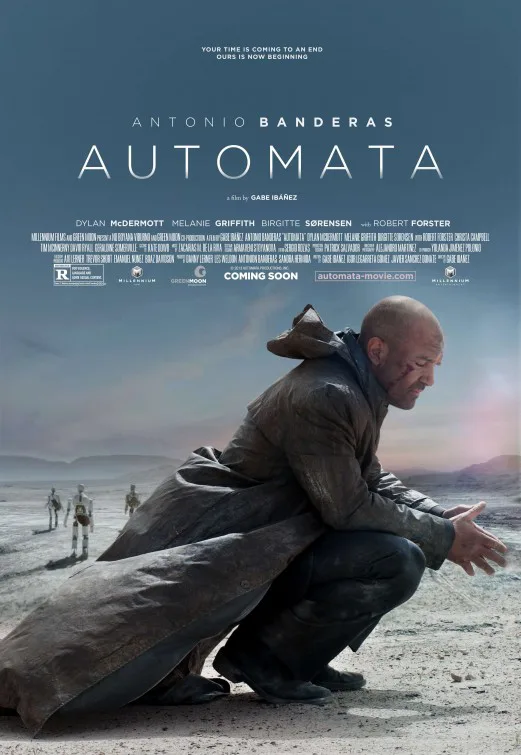“Automata” opens with onscreen text explaining the future 30 years from now. Solar storms have turned the Earth into a radioactive desert, killing 98% of the population in the process. As a result, the ROC company created “primitive robots to help build the walls and mechanical clouds that protect the humans.” There are millions of robots, all of which are controlled by two protocols: they cannot harm any form of life and they can neither repair themselves nor alter another robot in any fashion. “These rules are unalterable,” the screen says in boldface. Of course, this is not a true statement.
Science fiction is often used in allegorical fashion. It may not be fair to judge “Automata” by this gauge, but the film is so deathly somber and heavy-handed that I can only assume director Gabe Ibáñez wanted to tell us Something Important. Your guess is as good as mine as to what that is. The score by Zacarías M. de la Riva features choral voices singing melancholy notes while scenes one cannot take seriously flash before our eyes. The disconnect is akin to having the Harlem Boys Choir score from “Glory” paired with a Wayans Brothers movie. No film featuring a sex robot should pretend it has the gravitas level of a Morgan Freeman narration. It should at least be fun, which “Automata” is most certainly not.
More on the sex robot later; she’s an integral part of what passes for the plot. “Automata” begins with Dylan McDermott discovering a robot violating the second protocol—the one about self-repair. McDermott shoots it in the head, damaging the one part of the robot that might explain why it has suddenly violated an “unalterable” rule. A lot of robots get shot in this movie, and not one of them remotely attempts to violate the first protocol—the one about harming people. Ibáñez takes great pleasure in showing these low-budget, inanimate objects slowly dismembered by gunfire. Hitting their off switches would be just as effective, but “Automata” needs some kind of action to keep the audience involved.
The screenplay is so adamant about shoving in as many sci-fi tropes as possible, it fails to cohere into anything that makes narrative sense. The visuals owe massive debts to “Blade Runner” and the “Mad Max” movies. In addition to unwisely evoking memories of both, “Automata” throws in a shadowy corporation, an apocalyptic future, dangerous radioactivity, robots who become self-aware, scientific mumbo-jumbo and the end of civilization. Into it all, an insurance adjuster shall lead us.
Said adjuster, Jacq Vauchan, is played by a bald, suitably apocalyptic looking Antonio Banderas. Vauchan has grown weary of trudging through hazardous rainfall to deal with customers of ROC. We first meet him as he’s investigating a robot accused of murdering the family dog by brushing its fur to death. The robot is innocent. Vauchan decides he’s getting too old for this you-know-what.
Vauchan wants to move his pregnant wife, Rachel (Birgitte Hjort Sørensen), from the brutal inner city to a beachside resort he keeps seeing in childhood flashbacks. Rachel thinks he’s crazy, and so do we once we realize the seaside is far more irradiated. Rachel exists solely to perform damsel-in-distress duty during the climax, where the villains drag her and her newborn baby into an extremely radioactive desert for no logical reason whatsoever.
Before that happens, ROC sends Rachel’s hubby to an expert to determine what caused the robot Wallace shot in the opening scene to gain knowledge of itself. The expert, Dr. Dupre (Melanie Griffith), is skeptical about robots having protocol violating capabilities, despite the fact that she also runs a brothel whose S&M robots kinda violate their first protocol. “I specialize in pleasure and pain,” Cleo the sex robot tells Vauchan before she’s implanted with the other robot’s self-aware chip. She also specializes in driving getaway cars, which comes in handy when two little kids inexplicably shoot Dr. Dupre in the face.
As they head deeper into the desert to discover the “clocksmith” who’s retooling the robots minus their second protocol, Cleo becomes Vauchon’s protector. Armed members of ROC, including McDermott and a game Robert Forster, follow them with the intent to destroy both the robots and their colleague. More robots get shot, and in the film’s one true moment of excitement, somebody gets blown away with a flare gun.
Despite her newfound intelligence, Cleo’s appearance (she’s practically naked and has two large round circles that pass for a booty) and her voice (provided by Griffith) never let us forget her original function. She may be able to repair herself and is smart enough to help build a highly intelligent giant robotic cockroach, but she’s still reduced to moaning hilariously when sensing male arousal. You’ll be sinking in your seat as a drunk Vauchan contemplates Cleo’s services. At least the sad choir is wise enough not to sing over this sequence.
About that giant, super-evolved robotic cucaracha: I think it may hold the key to “Automata”’s allegory. If nothing else, it’s where all roads lead. Armed with that detail, you now know if you want to sit through this film. Personally, if I were you, I’d bypass it for a double feature of “Cherry 2000” and “Runaway.” You’ll get your fill of sex robots and killer robot roaches, with none of the dreary seriousness and overstuffed plot of “Automata”. The quality will be about the same.




















